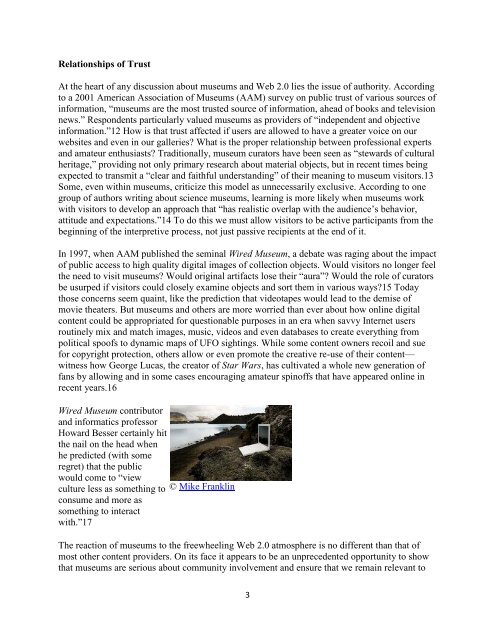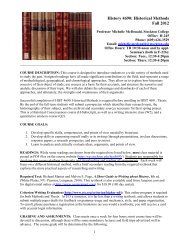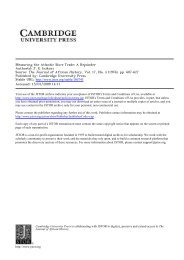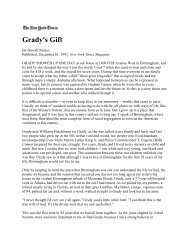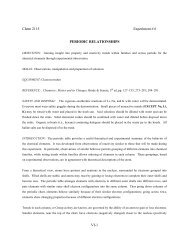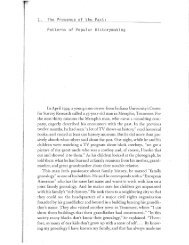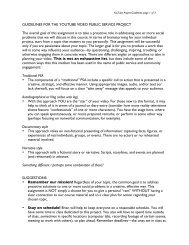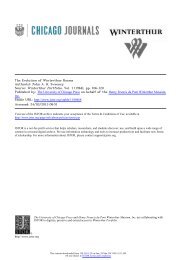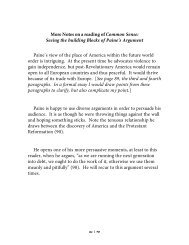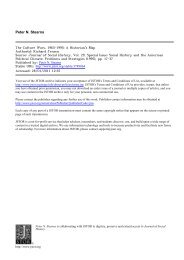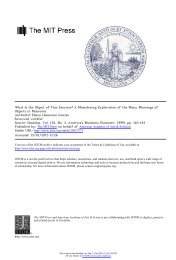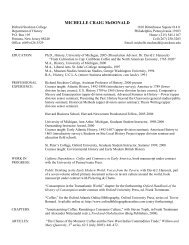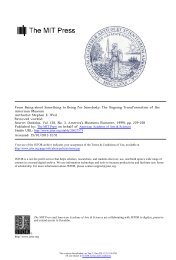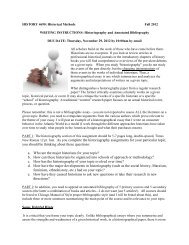can museum allow online users to become participants?
can museum allow online users to become participants?
can museum allow online users to become participants?
Create successful ePaper yourself
Turn your PDF publications into a flip-book with our unique Google optimized e-Paper software.
Relationships of Trust<br />
At the heart of any discussion about <strong>museum</strong>s and Web 2.0 lies the issue of authority. According<br />
<strong>to</strong> a 2001 Ameri<strong>can</strong> Association of Museums (AAM) survey on public trust of various sources of<br />
information, ―<strong>museum</strong>s are the most trusted source of information, ahead of books and television<br />
news.‖ Respondents particularly valued <strong>museum</strong>s as providers of ―independent and objective<br />
information.‖12 How is that trust affected if <strong>users</strong> are <strong>allow</strong>ed <strong>to</strong> have a greater voice on our<br />
websites and even in our galleries? What is the proper relationship between professional experts<br />
and amateur enthusiasts? Traditionally, <strong>museum</strong> cura<strong>to</strong>rs have been seen as ―stewards of cultural<br />
heritage,‖ providing not only primary research about material objects, but in recent times being<br />
expected <strong>to</strong> transmit a ―clear and faithful understanding‖ of their meaning <strong>to</strong> <strong>museum</strong> visi<strong>to</strong>rs.13<br />
Some, even within <strong>museum</strong>s, criticize this model as unnecessarily exclusive. According <strong>to</strong> one<br />
group of authors writing about science <strong>museum</strong>s, learning is more likely when <strong>museum</strong>s work<br />
with visi<strong>to</strong>rs <strong>to</strong> develop an approach that ―has realistic overlap with the audience‘s behavior,<br />
attitude and expectations.‖14 To do this we must <strong>allow</strong> visi<strong>to</strong>rs <strong>to</strong> be active <strong>participants</strong> from the<br />
beginning of the interpretive process, not just passive recipients at the end of it.<br />
In 1997, when AAM published the seminal Wired Museum, a debate was raging about the impact<br />
of public access <strong>to</strong> high quality digital images of collection objects. Would visi<strong>to</strong>rs no longer feel<br />
the need <strong>to</strong> visit <strong>museum</strong>s? Would original artifacts lose their ―aura‖? Would the role of cura<strong>to</strong>rs<br />
be usurped if visi<strong>to</strong>rs could closely examine objects and sort them in various ways?15 Today<br />
those concerns seem quaint, like the prediction that videotapes would lead <strong>to</strong> the demise of<br />
movie theaters. But <strong>museum</strong>s and others are more worried than ever about how <strong>online</strong> digital<br />
content could be appropriated for questionable purposes in an era when savvy Internet <strong>users</strong><br />
routinely mix and match images, music, videos and even databases <strong>to</strong> create everything from<br />
political spoofs <strong>to</strong> dynamic maps of UFO sightings. While some content owners recoil and sue<br />
for copyright protection, others <strong>allow</strong> or even promote the creative re-use of their content—<br />
witness how George Lucas, the crea<strong>to</strong>r of Star Wars, has cultivated a whole new generation of<br />
fans by <strong>allow</strong>ing and in some cases encouraging amateur spinoffs that have appeared <strong>online</strong> in<br />
recent years.16<br />
Wired Museum contribu<strong>to</strong>r<br />
and informatics professor<br />
Howard Besser certainly hit<br />
the nail on the head when<br />
he predicted (with some<br />
regret) that the public<br />
would come <strong>to</strong> ―view<br />
culture less as something <strong>to</strong> © Mike Franklin<br />
consume and more as<br />
something <strong>to</strong> interact<br />
with.‖17<br />
The reaction of <strong>museum</strong>s <strong>to</strong> the freewheeling Web 2.0 atmosphere is no different than that of<br />
most other content providers. On its face it appears <strong>to</strong> be an unprecedented opportunity <strong>to</strong> show<br />
that <strong>museum</strong>s are serious about community involvement and ensure that we remain relevant <strong>to</strong><br />
3


